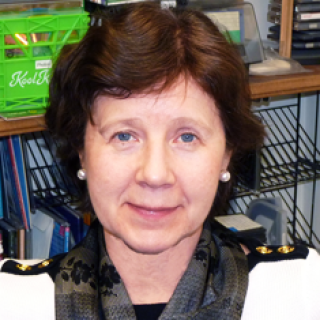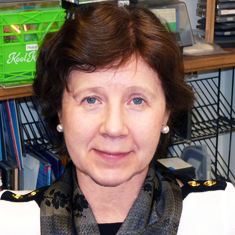
Nadya I. Tarasova, Ph.D.
- Center for Cancer Research
- National Cancer Institute
- Bldg. 538, Rm. 151
- Frederick, MD 21702-1201
- 301-846-5225
- Nadya.Tarasova@nih.gov
RESEARCH SUMMARY
Dr. Tarasova heads the Synthetic Biologics Facility (SBF) which generates chemical biology tools and drug candidates for molecular targets identified by CCR research groups and collaborators from academic labs. It develops new methods and technologies in molecular discovery. The facility focuses on application of rational approaches for the design of inhibitors predominantly for “undruggable” molecular targets. The SBF develops new chemical approaches in structural stabilization and for improving pharmacological properties of synthetic biologics.
Areas of Expertise
Research
The use of chemical biology tools for studying protein functions has many advantages over applications of genetic approaches, such as gene knockouts shRNAs and siRNAs, particularly for multifunctional proteins. Chemical probes allow for interrogation of a subset of protein-protein interactions rather than eliminating all functions of the protein under study. Consequently, they are instrumental in uncovering detailed mechanisms of protein function that include feedback loops and autoinhibition. Chemical probes also provide for more efficient translation of findings into the clinic because many of them represent drug leads. However, the wide use of chemical probes is hampered by difficulties in their generation and characterization. Therefore, SBF develops new technologies that simplify and accelerate identification, generation and characterization of chemical probes. Three approaches for identification of binders are used depending on the target: 1) Virtual screening of large libraries of Synthetically Accessible Virtual Inventory (SAVI); 2) Self-assembling peptide antagonists of integral membrane proteins that form fully synthetic virus-like particles and thus are able to deliver themselves effectively in vivo; 3) Cell-permeable peptidomimetics with rigid and predictable structures amendable to rational drug design.
External funding of the projects includes: CDMRP Prostate Cancer Research Award PC08116 'Self-assembling peptide nanoparticles targeting prostate tumors' and CRADA with Oncolinx Pharmaceuticals “Pre-clinical Development of Azonafide-based Antibody Drug Conjugates”.
Publications
- Bibliography Link
- View Dr. Tarasova's Full PubMed Summary.
Pooled screening for antiproliferative inhibitors of protein-protein interactions.
High-affinity interaction of the K-Ras4B hypervariable region with the Ras active site
Heteromerizatioin of chemokine (C-X-C motif) receptor 4 with alpha 1A/B-adrenergic receptors controls alpha 1-adrenergic receptor function
Structure of the Rpn13-Rpn2 complex provides insights for Rpn13 and Uch37 as anticancer targets
Structural plasticity of a transmembrane peptide allows self-assembly into biologically active nanoparticles
Biography

Nadya I. Tarasova, Ph.D.
Dr. Tarasova was trained as a bioorganic chemist. She obtained her Ph.D. in chemistry at Lomonosov University, Moscow, Russia in 1981. After postdoctoral training in the lab of Prof. Bent Foltmann at Copenhagen University, Denmark, she established a group working on the chemistry of proteolytic enzymes in the Chemistry Department of Lomonosov University. Dr. Tarasova joined the ABL-Basic Research Program of NCI as visiting scientist in 1991 and became a staff scientist in NCI Center for Cancer Research in 1999. She was appointed as Head of the Synthetic Biologics Facility in 2008.
